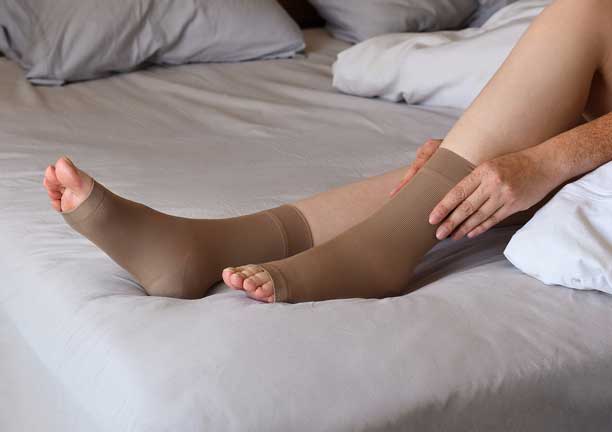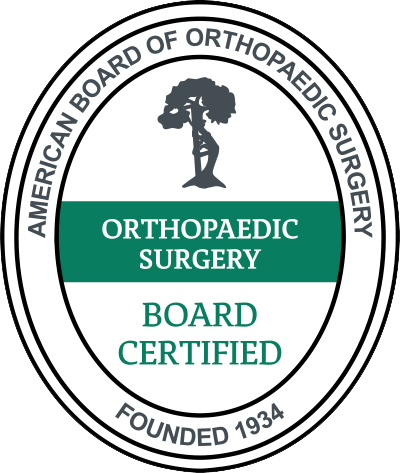Medically Reviewed by Dr. Paulina Piekarska
Key Takeaways
- Compression socks help reduce swelling and prevent blood clots after surgery.
- Most patients wear compression socks for 2–6 weeks, depending on the type of surgery.
- Wearing compression socks for too long or wearing them too tight can cause complications.
If you’ve just had surgery, compression socks might seem like a small detail, but they can make a big difference in your recovery. This guide is for post-orthopedic surgery patients looking to optimize recovery and reduce complications.
Not only do compression socks improve blood circulation and reduce the risk of blood clots, but they can also help alleviate swelling and discomfort. We’ll explore exactly what compression socks are, and some of the most common questions we get relating to wearing them after surgery. Let’s dive in!
What are Compression Socks?
Compression socks are specialized socks that are designed to improve blood flow in the legs by applying pressure to the lower limbs. In the medical field, they are commonly used to prevent and treat various conditions such as deep vein thrombosis, edema, and varicose veins.
Doctors often recommend them after surgery because they help reduce swelling, boost circulation, and lower your risk of complications. Compression socks come in a variety of styles and strengths, and should be worn as directed by a healthcare provider.
Most Common Questions About Wearing Post-Surgical Compression Socks:
Why do I need to wear compression socks after surgery?
Compression socks are designed to help improve blood flow and circulation in the legs. They do this by applying pressure to the legs in a graduated manner, with the most pressure at the ankle and gradually decreasing up the leg. This helps to push blood and other fluids back up toward the heart, reducing the risk of blood clots and swelling in the legs.
Compression socks are often used by people who spend a lot of time sitting or standing, such as travelers, office workers, and people with varicose veins or other circulation problems. They can also be helpful for people recovering from surgery or injuries, as well as for athletes looking to improve their performance.
How long will I need to wear compression socks after surgery?
The length of time that you should wear compression socks after surgery will depend on the type of surgery you had and the instructions provided by your surgeon. In general, compression socks should be worn for at least the first few days after surgery, and then as directed by your surgeon.
For example, if you had knee replacement surgery, you may be instructed to wear compression socks for 2-4 weeks post-surgery. In the case of a vein surgery, the recommended time may be longer, up to 6-8 weeks or even more.
It’s important to follow the specific instructions provided by your surgeon or doctor, as they will take into consideration the type of surgery and your individual recovery process.
When should I not wear compression socks?
While compression socks can be beneficial for many people, there are some situations in which they should not be worn. Some of these include:
- Medical Conditions: If you have certain medical conditions, such as severe peripheral arterial disease, congestive heart failure, or skin infections, wearing compression socks could potentially worsen these conditions or cause complications.
- Allergies or Sensitivities: Some individuals might be allergic to the materials used in compression socks or may have sensitivities that lead to skin irritation or discomfort when wearing them. If you experience allergic reactions or irritation, it’s best to discontinue use and consult a healthcare provider.
- Improper Fit: If compression socks are not properly fitted, they can cause more harm than good. Ill-fitting socks might lead to circulation issues, discomfort, or even exacerbate existing conditions. It’s crucial to get the correct size and compression level recommended by a healthcare professional.
- Nerve Impingement or Neuropathy: If you have nerve impingement or neuropathy, compression socks might increase pressure on sensitive nerves and potentially worsen symptoms. In some cases, compression garments can lead to numbness, tingling, or pain if not used cautiously.
Consult with your doctor or surgeon before wearing compression socks, especially if you have any underlying medical conditions or are recovering from surgery. They can advise you on whether compression socks are appropriate for you and, if so, what level of compression is best.
Is sleeping in compression socks okay?
Sleeping in compression socks can be beneficial for some people, especially those who experience swelling or poor circulation in their legs. However, it is important to follow the specific instructions provided by your doctor or surgeon regarding when and how to wear compression socks.
It’s also important to note that compression socks should be comfortable, not too tight and shouldn’t restrict blood flow. If you experience discomfort or numbness while wearing compression socks overnight, it’s best to remove them and consult with a doctor.
Can you leave compression socks on too long
How long you’ll need to wear compression socks depends on your surgery and your doctor’s advice — for some, it’s a few days; for others, it might be a few weeks. Wearing compression socks for too long can lead to a number of problems including:
- Decreased circulation: Decreased blood flow to the legs for extended periods of time can lead to a condition called “compartment syndrome” which can be serious and even life-threatening.
- Skin irritation: Prolonged wear of compression stockings can cause irritation, itching and redness on the skin. The skin may also become dry and flaky.
- Skin damage: This can include blisters, sores and even ulcers.
- Numbness and tingling: Wearing compression socks for too long can cause numbness, tingling and even a burning sensation in the legs.
Remember to take the socks off and give your legs a break, especially if you have been wearing them for an extended period of time.
What happens if you stop wearing compression socks too soon after surgery?
If you stop wearing compression socks too soon after surgery it may have some negative consequences. This can include:
- Increased swelling
- Blood clots
- Delayed healing
- Pain and discomfort
It’s crucial to follow the instructions provided by your doctor or surgeon regarding the use of compression socks and to consult with them if you have any concerns about when to stop wearing your compression socks.
Should I elevate my legs when wearing compression socks?
Elevating your legs while wearing compression socks can help to reduce swelling in the legs, which can be particularly beneficial after surgery or for people with conditions such as varicose veins. It can also help to improve blood flow and circulation in the legs, which can be beneficial for people who experience poor circulation.
Reduced discomfort is another benefit as you will feel less fatigue and pain. Furthermore, elevating your legs can also enhance the compression effect of the compression socks, which can be beneficial for people recovering from surgery or injuries.
Always follow the instructions provided by your doctor or surgeon regarding the use of compression socks and to consult with them if you have any concerns. Elevating your legs while wearing compression socks can be beneficial, but it’s important to do it in a comfortable position and for a limited time to avoid causing discomfort.
Conclusion
Compression socks can be a helpful aid in post-surgery recovery. They are easy to use and can be worn comfortably throughout the day. However, you should consult with your doctor to determine if compression socks are right for you and to get proper guidance on how to wear them correctly.
With the right support, compression socks can help you heal faster and get you back on your feet in no time! Schedule an appointment with OrthoConnecticut to learn if compression therapy is right for your healing plan.



















